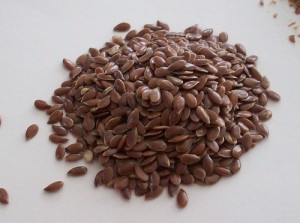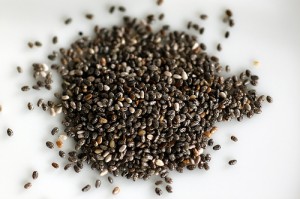Anne at Quick and Easy Cheap and Healthy asked the following questions on my chia egg substitute post:
“How does it [chia egg] compare health-wise to flax gel (which I use almost 100% of the time as my egg sub)? And cost?”
What great questions!
Let’s start with flaxseeds…
Pros:
- Flaxseeds are known for containing high levels of omega-3’s. Omega-3’s can help reduce inflammation, prevent and control high blood pressure and lower cholesterol.
- Taking 40 mg of flaxseed can help with symptoms of menopause.
- Flaxseeds are high in fiber, manganese, magnesium, folate and antioxidants.
Cons:
- Grinding the seed is necessary in order to absorb it’s nutrients.
- Grinding the seed is necessary in order to make flax eggs.
- Whole flax seeds can be stored for at least a year but once the seed is ground it will quickly oxidize or turn rancid.
- Flaxseeds are high in phytic acid. Some believe phytic acid is good for us. Others believe it is an anti-nutrient that must be avoided.
- Flaxseeds contain phytoestrogens. This can be beneficial to postmenopausal women or women with certain hormonal imbalances. However, since most of us already have more estrogen than we need and not enough progesterone, we should probably limit our flax consumption. Men might consider avoiding it all together. It is also important to note that one study shows pregnant women who consume flax oil quadrupled their rates of premature labor.
Price: The best price currently available at Amazon is Bob’s Red Mill Golden Flaxseed. If you sign-up for Subscribe and Save you can get them for $.13 per ounce.
And now for chia seed…
Pros:
- Chia seed is higher in Omega-3s than flaxseed. Chia seed oil is more than 60% omega-3 making it one of the highest commercially available source.
- Chia seed is higher in fiber than flaxseed. Three tablespoons of chia seeds contain fifteen grams of fiber while three tablespoons of flaxseeds contain nine grams of fiber. Chia seeds are often recommended for diabetics because the balance of soluble and insoluble fiber slows the absorption of glucose.
- Chia seeds have one of the highest levels of antioxidants in a whole food.
- Chia is a wonderful source for calcium. Three tablespoons contains 307 milligrams of calcium.
- Chia seed is easily digested and does not need to be ground.
- Chia seed will store up to two years in a dry place.
Cons:
- Due to their high fiber content, chia seeds can cause bloating and stomach issues.
- The high content of omega-3s can thin blood and lower blood pressure. Those who are on blood pressure medication or blood thinners should limit or avoid chia.
- Some people have allergic reactions to chia. Those who are allergic to sesame or mustard seeds are more likely to have an allergic reaction to chia.
Price: The best price currently available at Amazon is Alive and Aware Chia Seeds. They are $.98 per ounce.
The Bottom Line:
There are benefits to eating both flaxseed and chia seed. For this busy mom, chia seeds are the winner because they can be used whole. However, I don’t feel using either of them exclusively is a good idea. The key to a healthy and balanced diet is variety.
Chia Photo Credit: Little Blue Hen, Flaxseed Photo Credit: AlishaV

 May 11th, 2011
May 11th, 2011  Nancy
Nancy 

 Posted in
Posted in 